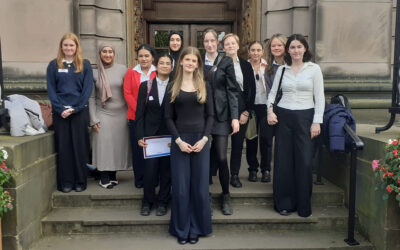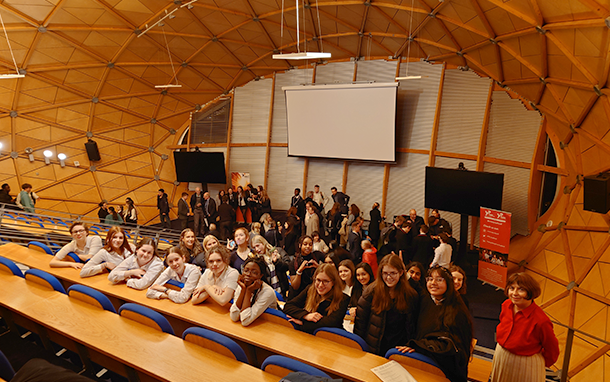Academic Enrichment
Academic Enrichment Programme for Upper School and Sixth Form
St
George’s academic enrichment programme for Upper School and Sixth Form provides a
vibrant range of activities that offers challenges to students’ thinking
and expands their view of the world around them. They gain a sense of
accomplishment while developing research skills and the ability to
debate, communicate confidently and effectively, solve problems, and
think critically, reflectively and creatively. These are skills, such as
the ability to learn effectively and apply new knowledge quickly, that
have inherent, lifelong value, with universities and employers seeking
candidates who possess them.




Enrichment Opportunities
The Higher Projects Qualification is an opportunity for students in
L5 and U5 to extend and develop their academic interests beyond the main
curriculum and explore their passion for a subject of their choice. It
can help them to discover the joys of independent learning, take
responsibility for their own study and develop new life and study
skills. The HPQ offers a focused structure for students to develop
project management, extended research and critical thinking skills
resulting in a qualification which is excellent preparation for the EPQ.
EPQ - The Extended Project Qualification is an A Level standard standalone qualification. It is designed to extend and develop students' abilities beyond the curriculum and prepare them for university or their future career. The project is worth half an A Level (28 UCAS points), is recognised by many universities and employers and may assist with course entrance opportunities. Students plan and carry out research on a topic that they have chosen, taking inspiration from something touched on in class or an issue that is personal and unrelated to their studies. They then use their research to produce a written report and, in the case of practical projects, an artefact or a production.
The opportunity to work with a specialist tutor in support of an application for Oxford, Cambridge or a competitive course allows discussion and consideration of new areas of learning. Students are encouraged to express their views and respond to others’ viewpoints, using the interaction to develop their thoughts and expand their exploration of a subject area that excites and stimulates their intellectual curiosity and development. Those who pursue such applications need to be self-starters, determined and focused. Through the support of a tutor, they are guided and nurtured towards success.
Writing an essay in around 40 minutes to answer an unseen question on a topic you may not have studied can be one of the challenges presented in university admission tests. Sessions are held with students every year to help them develop the skills and techniques that are required to respond appropriately.
If a student is required to undertake an admissions test, she is allocated a specialist tutor who will provide an overview of her preparation for the specific test requirements. Meetings range from discussion sessions to consideration of how to approach the paper or review of completed work. It is expected that each student will undertake independent preparation and provide completed work to her tutor on a regular basis.
Working with a specialist tutor in support of an application to Oxford, Cambridge or a competitive course is important, but the students are also offered the opportunity to explore different areas through interaction with their peers. These meetings are designed to encourage the students to talk, express views and respond to others’ viewpoints, using the interaction to develop their thoughts and produce coherent responses.
Traditional and medical interview practice forms just one part of the preparation for interviews. Each student who is offered an interview has the opportunity to meet with a specialist in their area of study to support the identification of key strengths and areas that may require refinement. In addition, consideration is given to body language, first impressions, demonstrating the thinking process and the etiquette of an interview situation.
An additional part of enrichment programme is our supercurriuclum. This takes students beyond their timetables, with opportunities to stretch, challenge and dig deeper, build enthusiasm and curiosity for a subject area or new topic and create capacity for independent study. It supports engagement with research and critical reflection and offers the opportunity to share with peers.
- A vibrant range of activities offers challenges to students’ thinking and expands their view of the world around them.
- Students gain a sense of accomplishment while developing research skills and the ability to debate, communicate confidently and effectively, solve problems and think critically, reflectively and creatively.
- These are meta-skills that have inherent, lifelong value, with universities and employers seeking candidates who possess them.
‘Did the chicken come before the egg?’ ‘Is it okay to ban certain books?’ Such questions form the basis of a discussion programme. Students are presented with differing viewpoints on the question, which is followed by a discussion and completed with a vote, the outcome of which is always interesting.
Refugee experience, differing political perspectives and an exploration of a renowned author’s life are examples of some of the varied speakers who come to St George’s. Each offers intellectual breadth to the girls, no matter their age.
These societies offer senior students the opportunity to lead, while also exploring an area of academic interest. Some societies meet weekly, while others are held only once or twice a term. Discussion sessions, reviews of articles or visiting speakers relevant to the field of interest form part of each society’s programme.
At the Debating Club, students tackle topics, big and small. Motions range from political hot potatoes and complex ethical or economic issues to more accessible motions, such as the pressure to attend university, or whether we should unmask all superheroes! Debating helps the students with confidence and expression, not only in terms of public speaking but also in sharpening their clarity of thinking and the structure, sequencing and persuasive impact of their line of argument. In addition to our weekly club debates, the more competitive students attend a range of competitions, including those run by university departments.
Our Model United Nations Club allows students to debate contemporary regional and global issues while representing a country. The debate simulates the procedures which take place at the United Nations. The club is student-led and student-run with three Co-Secretary Generals elected each session. These Co-Secretary Generals set weekly debates, train students new to the club and prepare student delegates for conferences. Students are required to write position papers and resolutions depending on the views of their assigned country. The club debates weekly in school during the lunch hour and participates in three to four regional conferences each session.

Our Model United Nations (MUN) society is an important group for older students develop knowledge of international politics and refine their debating skills and political knowledge. The MUN team hosted our own MUN Conference this year. The conference provided a platform for students to enhance their diplomatic skills, critical thinking abilities, and global awareness. Delegates engaged in lively debates, negotiated solutions to complex issues, and forged connections with students from diverse backgrounds. The event not only enriched the educational experience of our students but also reinforced the importance of effective communication and cooperation on a global scale. Three of our students won awards at the conference: Best new delegate in Security Council ; Best new delegate in Special Political and Colonisation Committee and Best new delegate in the Human Rights Committee. Fifteen students went to a Model UN conference at North Berwick High School. The students did themselves proud, debating key world issues on a number of committees representing the countries of France, Iran and Botswana. In a competitive environment of 11 schools and 178 students, the efforts and skill of the St. George's delegations were rewarded with the winning of a number of awards: Outstanding delegate on the Media Committee; Outstanding delegate on the Environment Committee [receives award] and Highly commended delegate, on the Human Rights Committee. Read the full story
The national Young Enterprise Company Programme gives thousands of students each year the opportunity to prepare for working life through the experience of running their own company, supported by volunteer advisers from business. Students from Lower 6 set up and run a company over the course of one academic year. They elect a Board of Directors from among their peers, raise share capital, and market and finance a product or service of their own choice. At the end of the year, they present a report and accounts to their shareholders. Students gain experience of the real business world, taking responsibility and being accountable to their shareholders and to each other.
YPI Finalists announced

This term Lower 5 have been working in teams to contact and represent a charity working to improve social issues in the Edinburgh area, as part of the Youth Philanthropy Initiative (YPI) Scotland project. The winning team from St George's will win £3000 for the charity they are representing, and students must research and demonstrate how this money will be spent in the local area. Read the full story
Independent Women is our pupil-led magazine. It is a platform for students to air their views on a host of issues. Articles have covered topics ranging from the Oscars to Obama, from the social network to social justice, from what we love to eat to what we love to hate. Each year a new editorial team is selected from Upper 6 and they strive to stay true to the core values of great journalism for a school audience. Each new team might toy with the design or introduce new sections but the aim is always to look outward and comment fairly on the world as the girls see it.















